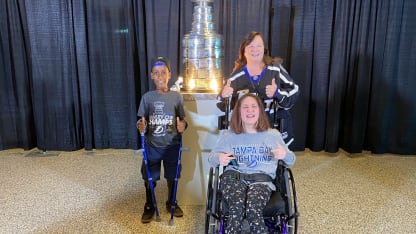The Tampa Bay Lightning's Community Heroes Program completed its ninth season in 2019-20 and has donated more than $20 million to over 750 different non-profits in the Tampa Bay community.
At each Lightning home game, a new Community Hero is honored by having their story told on Lightning Vision in front of a sellout crowd and presented with a check for $50,000 to donate to the charity of their choice.
But the value of being a Community Hero goes beyond the money and a night of recognition.
There's the ability to network and collaborate with other non-profits. There's the added credibility to the work Heroes do.
And there's a non-profit community that has blossomed because it's now connected where it was once disjointed.
On Thursday, November 19, the Lightning hosted a Heroes day with the Stanley Cup. Community Heroes from all nine seasons were invited to AMALIE Arena throughout the day to see the Cup up close and pose for pictures with it.
Lightning's Community Heroes get their day with the Stanley Cup
Heroes from all nine seasons of the program were invited to Amalie Arena to see the Cup up close and pose for pictures

We talked to four separate Community Heroes, from original Heroes to recent Heroes, to find out how the $50,000 donation impacted their charitable efforts.
Nearly everyone we spoke we with explained additional benefits of the program - benefits unforeseen to them upon the initial announcement they had been selected -- that continue to this day.
Here are their stories.
---
Madeline Robinson was raised on hockey growing up in her hometown of Montreal.
She was born during one of the 1958 Stanley Cup Final games in Montreal between the Canadiens and Boston Bruins.
"My mother was furious about the timing," she joked.
Robinson's been in the Tampa Bay area "for like 40 years" now. She bought season tickets for the Lightning's first season at Expo Hall.
"I'm a massive fan," she said. "Massive fan."
Robinson was honored as a Lightning Community Hero in 2014-15, the 11th Hero that season. She started her charity, Wheelchairs 4 Kids, in her spare bedroom. It was still in the infancy stage when she received the $50,000 donation from the Lightning Foundation and Lightning Community Heroes program.
"We were very, very young at that point, I think three years old," Robinson said. "To this day, it's the largest grant we've ever received. We don't get government funding or anything like that. The donation got us to the next level."
Robinson had previously worked for the Kids Wish Network and would often get requests for wheelchairs and ramps which fell outside the purveyance of the wish-granting organization. She noticed nobody was fulfilling those needs and decided to do something about it by starting Wheelchairs 4 Kids.
Robinson's non-profit provides wheelchairs, home and vehicle modifications and other assistive devices to children with physical disabilities.
"And we've always got a wait list, so the Lightning's grant allowed us to clear a lot of that list," she said. "It was amazing to be able to be like, 'I can pay for this. I can pay for this. I can pay for this. And here's your chair. And here's your bathroom modification. Here's your ramp.' It all went to the programs. It was a tremendous impact."
The follow-up beyond her night as Community Hero has been just as impactful to Robinson and Wheelchairs 4 Kids.
Whenever the WWE has an event at AMALIE Arena, the Lightning Foundation donates a suite for some of the children Robinson's charity aids. They make sure the suite is stocked with plenty of pizza and hot dogs.
The Lightning Foundation regularly hosts Community Heroes lunches and dinners which allows non-profits to network and collaborate with one another.
"We joke with them, I hope you like us because you're kind of stuck with us now," said Elizabeth Frazier, Lightning senior vice president of philanthropy and community initiatives.
As Robinson speaks to me, one of the Cup Keepers takes the Stanley Cup off its pedestal and places it at the feet of a young child in a Lightning-themed modified wheelchair Robinson has brought with her to the photo session. The brake on the youngster's wheelchair is a hockey stick.
Robinson, the lifelong hockey fan, said she had never been up close to the Stanley Cup before today.
"Our relationship with the Lightning is the best," she glowed. "I can't say enough."
---
Barbara Curts is one of the original Community Heroes from the program's first year during the 2011-12 season.
At the time, she was in her third year as a volunteer rape crisis counselor at the Crisis Center of Tampa Bay. She would meet sexual assault victims at the clinic, no matter the hour. She'd stay with them, hold their hand, set up services, go through the exam with them if they needed a comforting guide. She devoted over 45 hours a month to this cause.
She donated the majority of her $50,000 grant to the Crisis Center; the rest went to the Judeo Christian Health Clinic. The money allowed both non-profits to purchase more equipment. It also brought recognition to the services they provided through the visibility of being seen in front of nearly 20,000 fans during the in-game presentation.
"It helped people understand what we do there and that we are there," Curts said. "That was always the big thing: Crisis Center was the biggest-kept secret in Hillsborough County. I had clients call me and say, 'I had no idea you volunteered or that this organization existed.' So that was huge."
For Curts, there were therapeutic benefits to being named a Lightning Community Hero too.
She was a sexual assault victim herself. Putting herself and her story out in public was nerve-racking but also aided her healing process.
She was amazed how many people reached out either with their own story or looking for help after her night at AMALIE Arena.
"I even had a gentleman call and tell me he had been sexually assaulted by his priest and he needed to figure out how to get help," Curts said. "And I was able to help him."
Curts said just a week ago a young lady from Texas got in contact with her. The young lady had grown up in the Tampa Bay area and was the victim of sexual assault as a child. She realized her whole life was being dictated by the traumatic experience and was ready to share her story.
"We were able to actually take this young lady in Texas, connect her with our head of sexual assault services here in Tampa and now they have a plan together and they're talking all the time," said Curts, who is now the chair of the board of directors at the Crisis Center of Tampa Bay.
"It's amazing the help you can give people just by connecting individuals to the Crisis Center. I think the fact that Jeff and Penny (Vinik) do this is amazing. And they have made so many of us what I call popular. They've helped us become known, which has been so important in what we do."
Curts said back when she was sexually assaulted, it was difficult to get people to listen, to take her seriously. There weren't a lot of resources for sexual assault victims.
She's made it her mission to make sure other victims have the support she didn't.
"All these years later, I got the therapy," Curts said. "I got the therapy by helping people. I got the therapy by being able to tell my story and have other people get help.
"So, (being a Lightning Community Hero) was a total healing event for me."
---
Patti Sanchez lost her hearing at age six, the result of a bout with German measles she contracted three years earlier.
She remembers her mom reaching out for resources to aid her when she was young and companies stepping up to help.
It's what inspired her to give back when she became an adult.
Sanchez has been a fierce advocate for people who are deaf and hard of hearing to ensure they have equity in the workplace, in schools, everywhere. Sanchez joined the Macdonald Training Center in 2017 and since has placed 100 deaf or hard of hearing people into meaningful jobs through Tampa Bay.
Last season, she was honored as a Lightning Community Hero during a home game against the Los Angeles Kings on February 25, 2019, the 357th Community Hero since Jeff and Penny Vinik introduced the program in 2011.
She donated her $50,000 grant to the Macdonald Training Center.
"Not only were we able to get more individuals who are deaf and hard of hearing into the workforce through the donation, but we were able to focus specifically on the youth, individuals between the ages of 14 to 21," said Karenne Levy, the president and CEO of Macdonald Training Center. "The earlier you can make the intervention, the more successful it will be. So, we were able to support significant numbers of youth, and we were able to actually award one particular young lady the opportunity to attend college by giving her a scholarship. (Sanchez's donation) made a significant impact in the lives of people who are often forgotten and truly almost voiceless."
Sanchez said she was "in tears" when her story was broadcast on Lightning Vision during a first period media timeout and the sellout crowd inside AMALIE Arena rose in unison to applaud her charitable efforts.
"It was amazing. There's no word to describe. It was really an honor," Sanchez said. "All those people cheering for me, and not only for me but for those others that give back to the community. For me, this is something that's not a job, it's a passion. It comes from your heart."
Levy said Sanchez continues to work tirelessly to find employment for deaf or hard of hearing individuals as well as educating employers on the benefits of diversifying their workplace.
"Just her being that advocate and that champion and pushing it through every way, every day has made a difference not only in the lives of deaf and hard of hearing people but our community in general who then understand what it's like to have to work with someone who's deaf and hard of hearing," Levy said. "They have the hopes, goals, dreams as you and I and should be given the opportunity."
---
Susan Jacobs was the 12th ever Lightning Community Hero and was honored, fittingly, on 12/12 (Dec. 12) in the program's first season in 2011.
Jacobs started Wheels of Success, a non-profit aimed at providing low-income families with reliable transportation. Jacobs said the average cost to repair and recondition a donated car typically runs around $2,500 to $3,000.
The $50,000 donation she received paid for some cars and helped put the structure together to solicit funders for additional donations.
It also added credibility to a fledgling charity.
"Especially being one of the first (Community Heroes)," Jacobs said.
Maybe the greatest benefit to being a Lightning Community Hero according to Jacobs, however, is the non-profit community the program has cultivated. Previously, the non-profit world in the Tampa Bay area was disjointed she said. But the Community Heroes program has brought non-profits together in a way where they can collaborate with one another and aid each other in their various missions.
"I met so many people, even if we didn't have a direct correlation to help each other, we knew about each other," Jacobs said. "So if I heard something for them, I could send it. 'Hey, I heard about this grant. It doesn't apply to us, but it might apply to you.' It gave us a way to talk to one another in a different way, a way that wasn't competitive.
"It wasn't just, 'Okay, here's a check. You're on your way.' We're a family now."
Jacobs said the Community Heroes program has also helped to shine a light on all of the important work local non-profits were doing in the community, work that might not have been recognized previously.
"Look at now with the pandemic," she said. "If there wasn't Feeding Tampa Bay or non-profits like that, what would be going on? People would really be struggling more than they already are."
Jacobs said she wasn't much of a sports fan before becoming a Community Hero. On the night she was honored, then-Lightning CEO Tod Leiweke sat with her and explained the game of hockey while it was playing out before her on the ice.
Also that night, she got to take a picture with Hockey Hall of Famer and former Lightning captain Dave Andreychuk.
"Now, of course I'm a huge fan," Jacobs said, laughing.


















